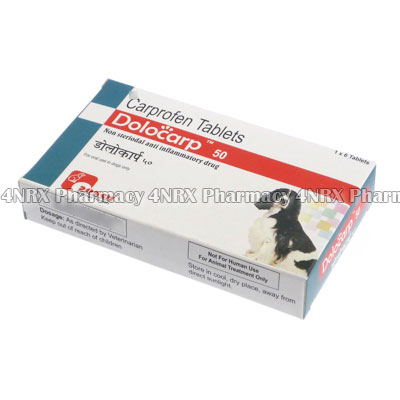 |
Home  4NRX Pet Pharmacy 4NRX Pet Pharmacy  Dolocarp (Carprofen) Dolocarp (Carprofen) |
|
|||||||||
|
|
Dolocarp (Carprofen)
What is Dolocarp (Carprofen) used for? Dolocarp (Carprofen) is an oral non-steroidal anti-inflammatory drug (NSAID) prescribed to treat elderly dogs suffering from arthritis or stiff joints. The medication prevents the action of certain enzymes in the body to reduce the swelling, pain, limited range of motion, and irritation associated with this condition. Your veterinarian may also recommend its use for the treatment of other unlisted conditions. How should I use Dolocarp (Carprofen)? Dolocarp (Carprofen) should always be administered according to your veterinarian's instructions to get the most effective results from treatment. One tablet is normally given daily, but the best dosage will be determined by your dog's weight, age, health, and the severity of its symptoms. These should be administered orally and may be hidden in a snack or meal if you have difficulty getting your pet to swallow them. Ask your veterinarian any questions you have about the medicine to ensure the correct usage. What are the side effects of Dolocarp (Carprofen)? Dolocarp (Carprofen) may cause side effects in some dogs such as:
Contact your veterinarian immediately if you notice any severe side effects including severe fatigue, loss off coordination, seizures, intense diarrhea that is watery or bloody, or signs of an allergic reaction such as skin rashes, swelling, or trouble breathing. These conditions may require lower doses, reduced application frequency, or immediate medical attention in serious cases to prevent more complications from occurring. Please Note Dolocarp (Carprofen) is only meant to be used to treat dogs and should never be administered to cats or humans. You are also advised to bring your pet in for a full medical check before using the medicine to make sure it does not have any other health conditions that may cause unexpected complications during treatment. Strictly follow all instructions provided to you by your physician or pharmacist while using Dolocarp (Carprofen). Optimum and safe dosage can differ based on the patient and the condition being treated. As this medication may be unsafe for certain patients, it is essential you always inform your physician if you are pregnant or breastfeeding, as well as if you have any allergies, other illnesses, or ongoing health conditions, and if you are taking any other form of medication, supplements, or herbal products. Immediately seek emergency medical care if you have an allergic or hypersensitive reaction. Common signs of a reaction include hives, swelling, skin rashes, chest pains, as well as trouble breathing or swallowing. 

|
||||||||||||||||||||||